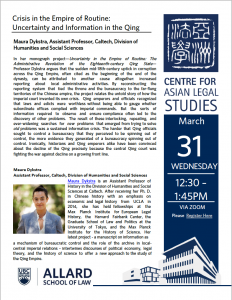CALS: CRISIS IN THE EMPIRE OF ROUTINE: UNCERTAINTY AND INFORMATION IN THE QING
[For more info on CALS website, click HERE]
Maura Dykstra, Assistant Professor, Caltech, Division of Humanities and Social Sciences
In her monograph project—Uncertainty in the Empire of Routine: The Administrative Revolution of the Eighteenth-century Qing State— Professor Dykstra argues that the sudden mid-18th-century uptick in corruption across the Qing Empire, often cited as the beginning of the end of the dynasty, can be attributed to another cause altogether: increased reporting about local administrative activities. By reconstructing the reporting system that tied the throne and the bureaucracy to the far-flung territories of the Chinese empire, the project relates the untold story of how the imperial court invented its own crisis.
Qing emperors and officials recognized that laws and edicts were worthless without being able to gauge whether subordinate offices complied with imperial commands. But the sorts of information required to observe and ensure compliance often led to the discovery of other problems. The result of these interlocking, repeating, and ever-widening searches for new problems that emerged from trying to solve old problems was a sustained information crisis. The harder that Qing officials sought to control a bureaucracy that they perceived to be spinning out of control, the more evidence they generated of a bureaucracy spinning out of control. Ironically, historians and Qing emperors alike have been convinced about the decline of the Qing precisely because the central Qing court was fighting the war against decline on a growing front line.
Speaker Bio: Maura Dykstra is an Assistant Professor of History in the Division of Humanities and Social Sciences at Caltech. After receiving her Ph. D. in Chinese history with an emphasis on economic and legal history from UCLA in 2014, she has held fellowships at the Max Planck Institute for European Legal History, the Harvard Fairbank Center, the Graduate School of Law and Politics at the University of Tokyo, and the Max Planck Institute for the History of Science. Her latest project – a manuscript on information as a mechanism of bureaucratic control and the role of the archive in local-central imperial relations – intertwines discourses of political economy, legal theory, and the history of science to offer a new approach to the study of the Qing Empire.
Event Details [MORE EVENT INFO CLICK HERE]
Date: March 31, 2021 at 12:30PM to 1:45 [PST]
Register: https://ubc.zoom.us/meeting/register/u5wqc-Gqrz4uE9CjDs2oB7g50i96OrKchjIp
Full Event Poster [CLICK HERE FOR MORE INFO]
